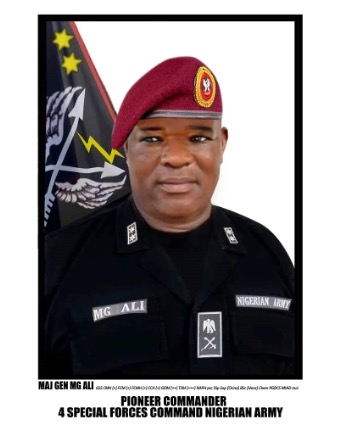Major General Moundhey Gadzama Ali is a distinguished military officer. He was born on April 7, 1966, in Borno, Nigeria. Known for his exceptional leadership, courage, versatility and expertise, Major General Ali has made significant contributions to the Nigerian Armed Forces and has served in various National and International Assignments. As a thorough senior Special Forces officer, he has led troops on successful military operations such as Operation Hard Knock where he led the first successful re-enforcement into Turbmangburg, Liberia in December 1995. During the breakdown of peace agreement in Liberia April 6 war, Ali was instrumental in creating a buffer between Joint NPFL and ULIMO – K onslaught on ULIMO-J at Vai Town, Liberia. Gadzama was electoral commissioner and the first to land a Helicopter in Tikpe Town Rivercess County Liberia, which was hitherto unimaginable. He went ahead to conduct a peaceful election that brought Charles Ghangy Taylor into power in Liberia.
Ali’s deductive prowess led to the relocation of Charles Taylor from Sierra Leone’s International Criminal Court to the Hague. Gadzama was key in sourcing information on where all Charles Taylor’s heavy guns were hidden and provided same to ECOMOG High Command. The seizure of these guns led Charles Taylor to accept ECOWAS Peace Agreements.
Ali is a self-driven, result-oriented with a positive outlook, clear focus and highly skilled. A natural forward planner who critically assesses his performance. He is mature, credible, and comfortable in dealing with executives. Moundhey is also reliable, tolerant and determined. Gadzama is an empathic communicator with ability to see things from the other person’s point of view. An officer who is always keen for new innovations and ever willing to share his experience enthusiastically. Ali is responsible and accountable. Moundhey has great ability to get on with others and observed to be a team-player. A ubiquitous soldier whose self denial and quest to see things done in the right perspective within shortest and quickest means knows no bound. Gadzama is a risk taker as indicated in the clearance of the Ikeja Bomb Blast site in July 2018 even when both local and international military engineers concluded that, it will take nothing less than 25 years to venture into the site.
He believes in the principle that, “the hardest things are the easiest to do”.
Moundhey is a roving officer who waits for no directives when the right decision is to be taken. Several times, he planned and led Operations YANCIN TAFKI I & II, NUT CRACKER I & II, TURA TAKAI BANGO, which led to the killing of notorious terrorist kingpins such as Terwase Akwaza alias Gana, Bujji Bazamfari, Buba the Chief logistics officer of Boko Haram in Lake Chad Basin and the demolition of their structures. This led to the restoration of peace to troubled areas in the North East, North West and North Central Regions of Nigeria. He believes in the principle that, “the hardest things are the easiest to do”. Ali excels in difficulties and impossibilities. He has authored several valuable papers such as; Water Treatment and Distribution in Kaduna Metropolis, which was his First Degree Project, The United Nations and the New World Order was his Master’s Thesis, Biochemical: The poor man’s nuclear weapon, Economic Importance of Water Hyacinth, Welcome Back Macau with several researches, training and operational materials, policy papers, poems on Special Forces and articles to mention a few. He engages in several social and community development projects, he supports initiatives focused on small and medium-scale enterprises, agro-businesses, education, healthcare and poverty alleviation.
DECORATION
In recognition of his outstanding performance in the Nigerian Army, Major General Moundhey Gadzama Ali mni has pioneered over nine new establishments of the Nigerian Army and received several awards and decorations, including the General Service Star (GSS), Distinguished Service Star (DSS), Meritorious Service Star (MSS), Forces Service Star (FSS), Chief of Army Staff Commendation Award Double Dagger (CCA++), Training Support Medal (TSM+++), Nigeran Army Purple Heart Medal (NAPH), Field Command Medal (FCM++) Field Command Medal of Honour (FCMH +++), General Operations Medal (GOM), Passed Staff College (psc), Diploma in Special Forces Operations – China (Dip Sop {China}), Bachelor of Science (honours) degree in Chemistry (BSc {Hons} Chem), Post Graduate Diploma in Computer Science (PGDCS), Masters in International Affairs and Diplomacy (MIAD). Finally, General Ali is a proud Member of the National Institute (mni).
EDUCATION
Major General Moundhey Gadzama Ali attended Central Primary School in Hong, Adamawa State. He later pursued his secondary education at Government Secondary School Gwoza and Government Science School in Bama (Pioneer Pure Science School Students). Continuing his academic journey, he enrolled in Borno College of Basic Studies, Maiduguri. He then gained admission to the prestigious Nigerian Defence Academy as part of Course 37 (Pioneer Degree Cadets), where he obtained a Bachelor of Science (Honors) degree in Chemistry.
In addition to his academic achievements, Major General Ali holds a Diploma in Special Forces Operations from Shijiazhuang Army Academy in China. He has also completed various specialized courses, including 17 certificates from the United Nations Institute of Training and Research Programme on Correspondence Instruction (UNITAR POCI) – Peace Operations Capability Readiness System, a Post Graduate Diploma in Computer Science, and a Master’s degree in International Affairs and Diplomacy from Ahmadu Bello University (ABU) Zaria. He is a Member of the National Institute, Kuru.
MILITARY CAREER
General Ali has served in different capacities ranging from Platoon to Company Commander to Commanding Officer as well as Brigade Commander. He was also a volunteer anti-bunkering patrol commander in 174 Battalion Badagary and served in the staff capacity of Intelligence and Operations officer for NIBATT 22 as well as Port Security Officer for Monrovia Port. As Commanding officer 35 Battalion, Gadzama assisted the Federal Government of Nigeria to Broker peace between leaders (Boay Loove, John Togo, Tompolo) of Movement for the Emancipation of Niger Delta (MEND) at no cost to the Government. Moundhey pioneered commander of about 9 military units and formations at different times, these include; 4 Special Forces Command, Nigerian Army Special Forces Command, Nigerian Army Special Forces School, Nigerian Army Operations Centre, Deputy Director Campaign Study Analysis and Director Training Research to mention a few. General Ali participated in several foreign operations, including the ECOMOG Reserve Coy (1992-1994), NIBATT 15 ECOMOG (1994-1995), and NIBATT 22 ECOMOG (1995-1998). He was also part of the United Nations Mission in Liberia (UNMIL) in the year 2004-2005 and finally Deputy Theatre Commander Operation Lafiya Dole from the year 2019 to 2020. He has also participated in several local operations namely: Operation TURA TAKAI BANGO, Operation NUT CRACKER I & II, Operation AYEM AKPATUMA III, Operation ZAMAN LAFIYA, LAFIYA DOLE, Operation YAFCIN TAFKI, Operation VIGILANCE and Operation MUGUN BUGU. Additionally, he was the initiator of the maiden All Combat Arms & Combat Support Service Schools’ Trainees’ final exercise to clear NAMTA to mention a few.
Moreso, commanding the entire Special Forces in Nigeria as the Commander of the Nigerian Army Special Forces Command and 4 Special Forces Command, advising the President through the Chief of Army Staff on the employment and tasking of Special Forces in Nigeria. He also coordinated all Special Forces Operations through Special Forces Brigades and conducted Operation NUT CRACKER I around Nasarawa, Plateau, Kogi, Kwara, Niger, Ebonyi, Enugu and Western Kaduna states, leading to the capture of Boko Haram terrorists and destruction of bandits’ camps and rescue of 778 women and children. He also conducted Operation NUT CRACKER II in Niger State, leading to the clearance of bandits from NAMTA and the general area. Operation AYEM AKPATUMA III oversaw the capture and neutralization of the dreaded Terwase Akwaza AKA Gana and his henchmen to include the capture of their spiritual leader and the destructions of their shrines thereby restoring peace in Benue, Taraba and Southern Plateau States.
He led the clearance of Zari, Garunda, Gudumbali, Kukawa and the eventual recapture of Baga from Boko Haram and ISWAP terrorists. Moreso, the clearance of the Marte, Tumbus alongside troops of the Multinational Joint Task Force (MNJTF), clearance of Navy Base, Doron Baga and clearance and denying Cross Kauwa and freedom of movement to ISWAP in the general area, denying BHTs crossing points at Kareto, Zari, Garunda, Gudumbali and Magumeri amongst others. As Commander 4 Special Forces Command, he was the only command that successfully cleared Timbuktu Triangle to include clearance of Boko Haram and ISWAPs spiritual headquarters of ALAFA, to include prominent BHTs and ISWAPs camps of KAFA, BUK, AJIGIN and TALALA.
As the Senior Research Fellow at the Nigerian Army Resource Centre, Ali institutionalizes and mainstreams novel solutions to tactics, operations, administration, and logistic challenges of the Nigerian Army. He conducts independent analysis to develop policy formulation for the Nigerian Army, publishes articles on researched topics within the army, provides valuable research, and organizes talks, presentations, and provides subject matter experts. He also conducts the documentation of Nigerian Army operations across the country and assists commanders and participants to produce books and memoirs.
As the Commandant of the Nigerian Army School of Infantry, Ali revolutionized training by constructing strenuous obstacle apparatuses and training courses. He ensured practical include going to support 1 Division of Nigerian Army in clearance operations as practical for all NASI graduands for minimum of two months before awarding certificates to graduating trainees. Ali supervised the training of all officers and soldiers of the Nigerian Army on infantry techniques, tactics, and procedures. He conducts pre-induction training for Nigerian Army troops to be launched into the North West and North Eastern theatres of operation as well as prepare de-inducted troops prior to their return to unit, carries out research and development of the infantry training curriculum, and coordinates specialized training for troops of the Nigerian Army. He advises the Chief of Army Staff and Principal Staff Officers of the Army Headquarters, Training and Doctrine Command, and sister training institutions on Infantry training matters and best practices. He also suggests the need for training review and curricula development.



